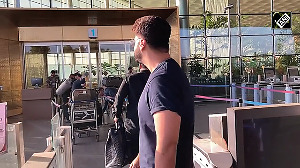The Singapore government has issued a new visa to former Sri Lankan president Gotabaya Rajapaksa, allowing him to stay in the country for another 14 days till August 14, a media report said on Wednesday.

The report on the extension of Rajapaksa's visit pass came a day after Sri Lanka's Cabinet spokesman Bandula Gunawardena said that the ex-president was not hiding and is expected to return to the island nation from Singapore.
Rajapaksa arrived in Singapore on July 14 on a private visit from the Maldives after he fled his country to escape a popular uprising against his government's economic mismanagement. He first fled to the Maldives on July 13 and from there he proceeded to Singapore the next day.
Rajapaksa has been issued a new visa, extending his stay here till August 11. His visit pass has been extended by 14 days, The Straits Times reported.
After Rajapaksa landed in Singapore, the Ministry of Foreign Affairs here confirmed that he had been allowed entry on a private visit. The ministry stressed that the ex-president had not asked for asylum.
Singapore generally does not grant requests for asylum, the spokesman had said.
The ex-president was issued a 14-day visit pass when he arrived at Changi Airport on a Saudia flight from the Maldives on July 14. He initially stayed at a hotel in the city centre, but is believed to have moved to a private residence, according to the report.
He has not been seen in public in Singapore.
When asked about Rajapaksa at a weekly Cabinet media briefing, Cabinet Spokesman Gunawardena told reporters on Tuesday that the former president was not in hiding and he is expected to return from Singapore.
Gunawardena, who is also the Minister for Transport and Highways and Mass Media, said he does not believe the former president fled the country, and is in hiding.
He, however, did not offer any other details of Rajapaksa's possible return.
Sri Lanka's Parliament on Wednesday elected Ranil Wickremesinghe, an ally of Rajapaksa, as the successor to Rajapaksa, who resigned after reaching Singapore. It was the first time in 44 years that Sri Lanka's Parliament directly elected a president.
Rajapaksa, 73, fled Sri Lanka after the July 9 uprising when people broke into the President's House after months of public protests against him for mishandling the country's worst economic crisis since 1948.
A massive protest on July 13 attempted to break into the parliamentary complex in continuation with the July 9 popular uprising, forcing then president Rajapaksa to leave the country to the Maldives and then to Singapore.
On July 9, anti-government protesters occupied the official residence of Rajapaksa and the private home of Wickremesinghe. The mob also torched the private residence of Wickremesinghe.
Sri Lanka has seen months of mass unrest over the worst economic crisis and many blame the former government led by Rajapaksa and his family for mishandling the island nation's economy. The government declared bankruptcy in mid-April by refusing to honour its international debt.
Sri Lanka, a country of 22 million people, is under the grip of an unprecedented economic turmoil, the worst in seven decades, leaving millions struggling to buy food, medicine, fuel and other essentials. Sri Lanka's total foreign debt stands at USD 51 billion.










